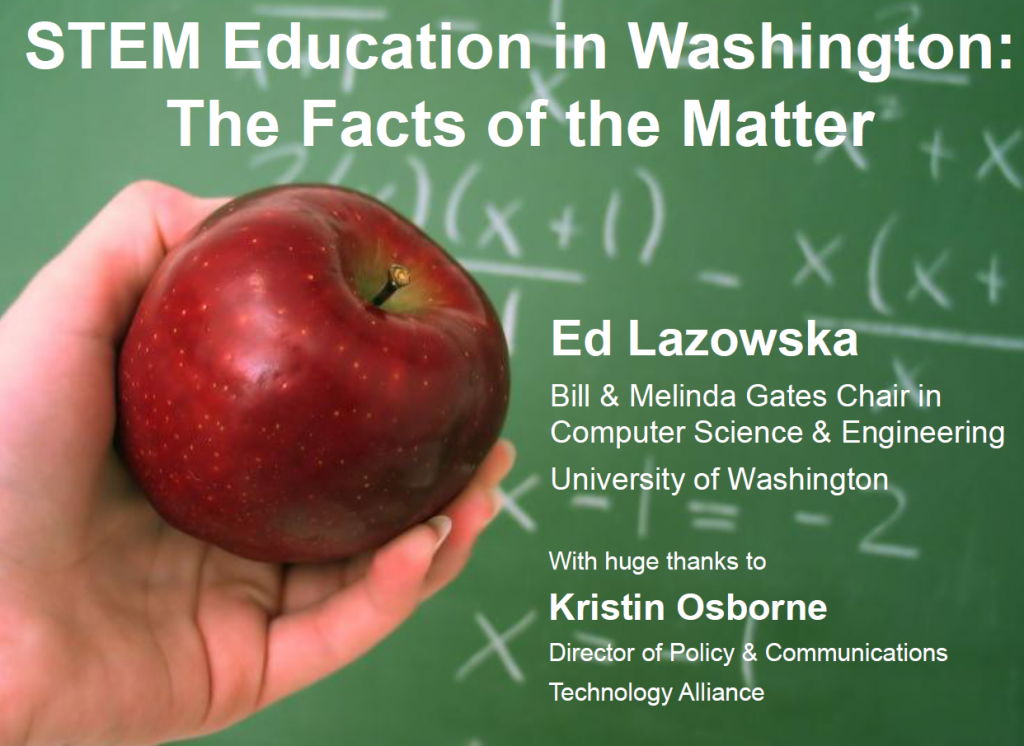 The Canary in the Mine: a frightening insight into the US Economic future.
The Canary in the Mine: a frightening insight into the US Economic future.
Based in part on Washington Post article, “U.S. pushes for more scientists, but the jobs aren’t there“
Here in Washington state, Ed Lazowska , the Bill and Melinda Gates Professor of Comp Sci at UW, is a very forceful advocate of the need for strengthening education in science and technology all the way through our system. He calls this “STEM.”
The problem I see is that Ed supports assumes that jobs will be there. What kinds of jobs?
In the highest of science and technologies … Physics, Molecular Biology, Comp Sci, Medicine, Chemistry, Mathematics .. the top jobs were once professorships. Then, and now, academic institutions … including universities and research institutes … fostered careers that produced an exponential increase in knowledge, planting the seeds of the industries that drive modern economies. These efforts at basic research were driven by professors.
“Professors” were not limited to universities. Great companies were founded by professors who brought their ideas and passions into the remunerative and productive world of capitalism. MIT, Berkeley, Cal Tech and, yes the UW, served a function very different than just teaching.
As professors, we .. both Ed Lazowska and I … believe that the only way to foster great scientists and engineers is by creating jobs for the best people in places where students can work and grow.
What if that system fails? Changes in biology careers challenge Ed Lazowska’s vision. As Principle Investigator on a large NIH training grant I find the future very worrisome not only for our excellent fellows but for the entire economy. According to a 2009 NSF survey, only 14 percent of those with a PhD in biology and the life sciences now land an academic position within five years. Paula Stephan, an economist at Georgia State University who focuses on the scientific workforce. says that the supply of of scientists has grown far faster than the number of academic positions.
This problem is not limited to the science and engineering faculties. Top scientists and engineers are creative people. Creativity is not just learning about he orbitals of carbon or theories of artificial intelligence. Creativity grows from the seeds of intellectual challenges students should get in college. Sadly, the challenges for the humanities and social studies are even worse. Political leaders do not understand the value of such “non productive” fields as literature, social studies and languages. The opportunities to become professors in these fields are challenged by Luddite legislators driven by a very short term view of how we educate the next generation. In the meantime we see all too few graduate students who can understand the principles behind their work or, once the work id=s done, write abut the work.
The malady that has decimated the PhDs in English literature has now spread to the sciences.
The first place that this failure impacts real people is at the level of the post doctoral fellow. Our system depends on the post doc. After working through their doctorates, the best scientists become apprentices .. post doctoral fellows .. working in a lab under top professors. These jobs used to last used to last up to three years, but now it’s not unusual to find scientists toiling away for six, seven, even 10 years. Paula Stephan, calls the post-doc system a “pyramid scheme” that enriches established professors without offering opportunities for the fellows. One of the leading voices for reform is Princeton University President Shirley Tilghman. Tilghman herself is a leading molecular biologist and an early role model for the remarkable new generation of female scientists. Tilghman calls the post-doc system , “dysfunctional and not sustainable in the long term.” From my own perch as a Training Grant Director, I see too many faculty “emplying” post docs as cheap labor rather than training the fellows for positions as independent scientists. nIH even encourages us to require fellows ot educate themselves in alternative carear chices as teacher, industrial technicians, drug salesmen, administrators,k and … of course .. intellectual property attorneys. What a waste!
I think the postdocs are the canaries in the mine. Whatever reforms we make in the current system, the American research engine will stall if we do not provide funds to employ the elite and talented people as basic scientists .. that is as “professors.” A very sad example of where we may end up comes form the recent Wall street failure. According to the Washington Post, the unemployment rate for physicists hovers around 1 to 2 percent. While academic positions have stalled, Physicists end up using their great mathematical skills in Wall Street .. creating the software and mathematics that support today’s computer driven investment wars. I smehow doubt that Bayesian mdoel for mdervitives is going to be the engine for tomorrow’s new industries.